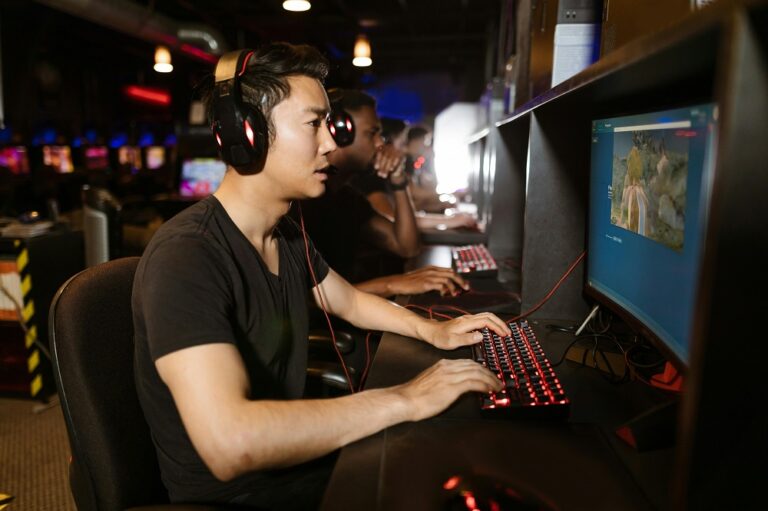When Did Your Game Last Win You a Trophy?
Gone are the days when playing video games was just a way to pass the time. Today, it’s a path to glory and gold. eSports, or competitive gaming, has turned joysticks and keyboards into tools of professional sport, complete with fans, sponsors, and massive prize pools.
But how did we get from arcade cabinets to packed arenas with millions watching worldwide? This seismic shift in gaming culture has not only transformed basements into battle arenas but also players into global icons!
The Humble Beginnings: Pong and Beyond
The journey of eSports can be traced back to the 1970s when the first known video game competition took place at Stanford University with the game Spacewar. This small gathering set the stage for what would become a worldwide craze. As games like Pac-Man and Donkey Kong entered arcades, they brought with them the spirit of competition, laying the foundational stones of eSports. These games ignited a competitive spark among players, setting the framework for the structured competitions we see today.
Level Up: The 90s Boom
The 1990s saw the birth of several major franchises that are still significant in eSports today, such as ‘Street Fighter’ and ‘Doom.’ The release of ‘Doom’ in 1993, with its multiplayer capabilities, heralded a new era where gaming went from a solitary to a communal experience, setting the stage for networked play. This decade marked the rise of gaming communities, fostering connections that would fuel the industry’s explosive growth.
Arena Spectacles Transform the 2000s
With the advent of faster internet and better gaming technology in the 2000s, games like ‘StarCraft’ became phenomena in places like South Korea, where players were treated as celebrities. The 2000s also saw the establishment of eSports organizations like Major League Gaming (MLG), which organized tournaments across the U.S. with significant cash prizes.
How Did Twitch Revolutionize Gaming Viewership?
The launch of Twitch in 2011 revolutionized eSports by allowing anyone to stream their gameplay. This platform turned gamers into stars, some earning more than traditional athletes through sponsorships and ad revenue. Games like ‘League of Legends’ and ‘Fortnite’ have become not just games but spectator sports, with millions tuning in for live events.
Tracing the Money in the eSports Economy
Today, eSports is big business. The industry is expected to generate over a billion dollars in revenue annually, with events like the ‘Dota 2 International’ boasting prize pools exceeding $40 million. Major companies from Coca-Cola to Intel are now regular sponsors of tournaments, seeing the value in the vast, engaged audiences eSports draws.
Why Does a VPS Matter in eSports?
In the competitive world of eSports, where every millisecond counts, a Virtual Private Server (VPS) can make all the difference. Hosting game servers on a VPS ensures that gamers experience minimal latency, which is crucial for fast-paced, real-time games like ‘Counter-Strike’ and ‘League of Legends.’ By providing dedicated resources and enhanced security features, a VPS helps maintain the integrity and consistency of competitive play.
This not only supports fair competition but also protects sensitive player data from cyber threats. As eSports grows, the reliability and scalability offered by VPS hosting become indispensable tools for game developers and tournament organizers aiming to deliver a seamless gaming experience to millions worldwide.
Are you looking for top-tier performance in your digital operations? Choosing VPS hosting https://host-world.com/ ensures advanced infrastructure and strategic server locations. Why not consider a VPS America provider to benefit from robust data protection and high-speed connectivity crucial for both gaming and business applications? With VPS hosting USA, you gain reliable service and strong customer support, making it an ideal choice for stability and efficiency.
Will eSports Feature in the Olympics Soon?
The international growth of eSports has led to its recognition as a sport in many countries, and it is being considered for inclusion in the Olympics. The 2022 Asian Games marked eSports as a medal event, signaling its rising legitimacy on global platforms.
What Does the Future Hold for eSports?
As virtual reality technology advances and new gaming platforms emerge, the future of eSports looks brighter and more immersive. The question is no longer if gaming is a sport, but how far this digital sport can go. Will eSports stars one day be as revered as Olympic champions?
Are You Game?
The transformation of computer games into a recognized sport challenges traditional notions of athleticism and competition, proving that mental agility can be just as demanding as physical prowess. As we look to the future, it’s clear that eSports has carved out its own space in the pantheon of sports, one digital victory at a time!






